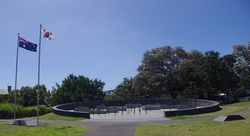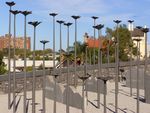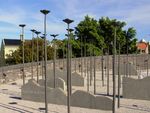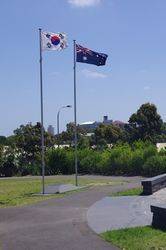
Korean War MemorialPrint Page 
The monument commemorates the Australian and Korean veterans of the Korean War. It honours the military personnel of the Commonwealth of Australia and the Republic of Korea who served, suffered and died on the Korean peninsula during the years 1950 and 1953 in the cause of freedom, peace and justice among nations. This monument has been declared a “Military Memorial of National Significance” under the Military Memorials of National Significance Act 2008.
During the three year conflict, 339 Australians and 230,000 South Koreans made the supreme sacrifice. It is a monument that honours a friendship forged through war, between two different countries, cultures and communities.
The monument features 136 Rose of Sharon flower sculptures which commemorate those lives lost from New South Wales. The monument cost $700,000, of which $350,000 was contributed by the New South Wales Government, with the remainder raised by the Korean community and veterans’ groups, along with $25,000 from the Commonwealth Government.
The monument features a circular stone wall enclosing the site symbolising “strength”. A central pathway based on the taeguk or yin and yang symbol found on the South Korean flag symbolising “commemoration”. A field of metal sculptures based on the Korean national flower, the Rose of Sharon, symbolising “regeneration” and polished concrete blades representing the rugged mountains of Korea representing “remembrance”.
The Korean War (25 June 1950 – 27 July 1953) was a war between the Republic of Korea (South Korea), supported by the United Nations, and the Democratic People's Republic of Korea (North Korea), at one time supported by the People's Republic of China and the Soviet Union. It was primarily the result of the political division of Korea by an agreement of the victorious Allies at the conclusion of the Pacific War at the end of World War Two. After the war ended, the presence of Australians in Korea continued with a peacekeeping force until 1956. Of the 340 Australians killed during the Korean War, 43 were classified as ‘missing in action’ (MIA) and presumed dead.
Location
| Address: | ANZAC Parade, Bandstand Playground, Moore Park, Moore Park, 2121 |
|---|---|
| State: | NSW |
| Area: | AUS |
| GPS Coordinates: | Lat: -33.886804 Long: 151.218463 Note: GPS Coordinates are approximate. |
Details
| Monument Type: | Monument |
|---|---|
| Monument Theme: | Conflict |
| Sub-Theme: | Korea |
| Actual Event Start Date: | 20-June-1950 |
| Actual Event End Date: | 27-July-1953 |
| Designer: | POD Landscape (Architecture) |
| Artist: | Jane Cavanough |
Dedication
| Actual Monument Dedication Date: | Sunday 26th July, 2009 |
|---|







